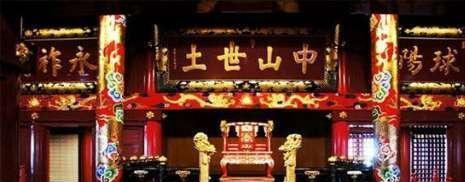The Ryukyu Islands, located in the western Pacific Ocean, between the islands of Taiwan and Kyushu in Japan, are like a string of pearls scattered in the Pacific Ocean. Historically, Ryukyu was an independent kingdom and a traditional vassal state of China. Ryukyu and China trade closely, deeply influenced by Chinese culture, known as "Little China". However, in modern times, Ryukyu fell into the hands of the Japanese, and the Japanese still occupy Ryukyu to this day. As a traditional vassal state of China, why did Ryukyu fall into the hands of the Japanese?

First, let's learn about the history of Ryukyu. Ryukyu is an island country, although it is not large, but its geographical location is important, it is an important maritime hub for China, Japan, Southeast Asia and other places. Relying on prosperous trade, the Ryukyu Kingdom was very rich. As early as the Sui and Tang dynasties, Ryukyu had relatively close ties with China. During the Ming Dynasty, the envoys of the Ming Dynasty sent envoys to Ryukyu and changed the stream ball to Ryukyu, which was one of the hardcore clans of the Ming Dynasty. During the 277-year reign of the Ming Dynasty, the Ming Dynasty sent 20 envoys to Ryukyu and more than 300 tributes to China. The Ming Dynasty also migrated a large number of Fujian people to Ryukyu, which is also known as the Ryukyu "Min people with thirty-six surnames". The migration of the Min people to Ryukyu greatly promoted the development of Ryukyu and also promoted the relationship between China and Ryukyu.
In the last years of the Ming Dynasty, when the Ming Dynasty was worried about internal and external troubles and the country's strength was weakened, the Satsuma Clan, a powerful clan in southern Japan, seized the opportunity to invade Ryukyu and force Ryukyu to pay tribute. The Satsuma clan also occupied parts of the northern Ryukyu islands. In 1654, the Ryukyu Kingdom sent envoys to China to pay tribute, and the Shunzhi Emperor made Ryukyu Shangqi the King of Ryukyu, and Ryukyu became a vassal of the Qing Dynasty. However, although Ryukyu ostensibly submitted to the Qing government, it was actually controlled by the Satsuma Domain, which controlled the trade and management of Ryukyu and became rich by exploiting the Ryukyu Satsuma Domain, which was one of the important reasons why the Satsuma Domain could become the main force of the fall movement.
When the U.S. fleet arrived in Ryukyu in 1853, it mistakenly believed that Ryukyu was Japanese territory and demanded that Japan open the port of Naha in Ryukyu. Japan was jealous of the Qing government and frankly said that it had no right to decide on this matter, so the Americans went to Ryukyu and signed a treaty of commerce with the Ryukyu Kingdom, and the treaty was signed in Chinese and English. However, the Japanese thief did not die, and always coveted Ryukyu. In the 1860s, after the Blows of the Opium War and the Taiping Rebellion, the Qing government's national strength declined rapidly, and the Japanese began to grow bold, constantly creating friction and trying to annex Ryukyu.
In 1871, under the pretext that the Ryukyu islanders were killed by the indigenous people in Taiwan to create an incident, Japan brazenly sent troops to invade Taiwan, creating the famous "Peony Society Incident". The Qing government was worried about internal and external troubles, and had no time to take care of Ryukyu, for fear of triggering a war with Japan, so Prime Minister Yamen refused to recognize Ryukyu as a vassal state of China, compensated Japan with 500,000 taels of silver, and acknowledged the fact that Japan had annexed Ryukyu. Because the heart was still very jealous of the Qing government, Japan proposed to divide Ryukyu with the Qing government, proposing a plan to return the north to Japan and the south to China, but the Qing government refused, so the Qing government gave Ryukyu to Japan. The loss of Ryukyu reflected on the one hand the decadent and incompetent attitude of the Qing government, and on the other hand, it also reflected the decline of China's national strength at that time.